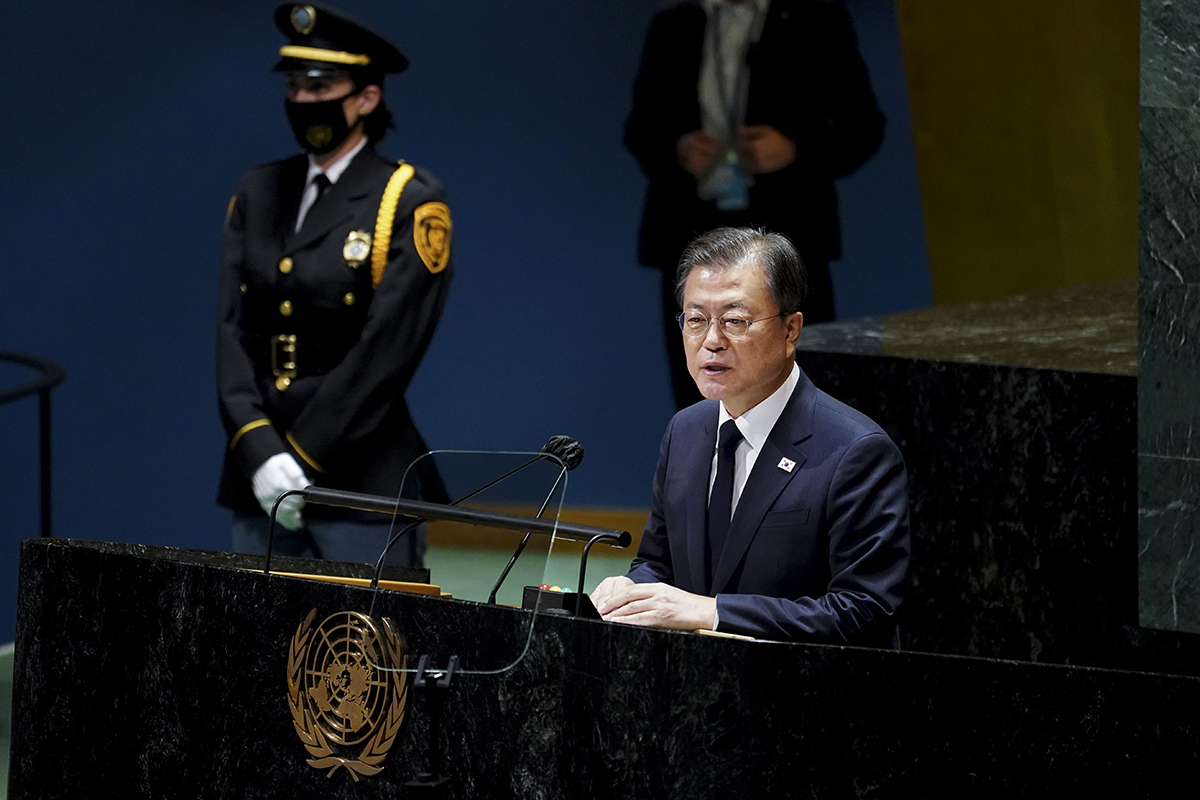There will be no immediate breakthrough in the ongoing discussions toward an end-of-war declaration without a change of attitude not just from North Korea, but also from the US, experts here said Tuesday.
President Moon Jae-in proposed declaring a formal end to the 1950-53 Korean War in his UN speech last month, a last-ditch effort to resume stalled diplomacy with North Korea before he leaves office in May.
Seoul officials have held a series of high-level meetings in recent weeks, wooing support for the proposal from the US and other countries. Even North Korea hinted at its intention to join the talks despite its confusing messages: back-to-back missile tests interspersed with reconciliatory gestures.
Early Tuesday, the still nascent talks appeared to be gaining fresh momentum, with the US showing renewed interest in the proposal.
US Special Representative for North Korea Policy Sung Kim told reporters he would visit Seoul later this week to discuss the end-of-war proposal. It was the first time a ranking US official had talked publicly about related talks happening between the two countries.
The remarks came after he met in Washington with his South Korean counterpart, Noh Kyu-duk, who said “a considerable amount of today’s discussions” had been devoted to the end-of-war declaration.
Kim also reiterated that his government has no hostile intent toward North Korea and is ready for dialogue without preconditions.
But just hours later, North Korea poured cold water on the cautious hopes of resuming dialogue by launching another missile test -- the fifth over the past month alone.
Seoul’s National Security Council expressed “deep regret” over the launch of what appeared to be a submarine-launched short-range ballistic missile.
“Both the US and North Korea are testing each other with strategic patience,” said Yang Moo-jin, a professor at the University of North Korean Studies in Seoul.
The professor said he found nothing new in the US nuclear envoy’s remarks on the end-of-war declaration, saying the intent appeared to be managing the Korean Peninsula situation and preventing further provocations from the North, rather than seeking an immediate resolution to the stalled talks.
“North Korea would not return to the negotiating table unless the US comes up with more concrete offers like security assurance and sanctions relief, the commitments made at the Singapore summit,” he added.
North Korea’s two-pronged strategy -- alternating between raising tensions and extending an olive branch -- has often produced false hopes of reconciliation. But South Korea seems eager to exploit the rare opportunities to engage the reclusive regime this time.
Seoul, in particular, is pinning high hopes on an end-of-war declaration, calling it the most effective way of starting the trust-building process with the North.
“It is not our ultimate goal but the starting point of resuming the inter-Korean talks,” a Cheong Wa Dae official said on condition of anonymity. “Of course, related talks cannot be made separately from denuclearization talks with North Korea.”
The US has expressed its full support for the resumption of inter-Korean dialogue but has remained mum over the possibility of an end-of-war declaration. Despite the purely political nature of the act, such a declaration could lead to talks toward a peace treaty. That would involve more complicated, legally binding discussions with US archrival China as well as North Korea.
The US has urged North Korea to return to the negotiating table without preconditions. But North Korea has said it would not resume talks until it was convinced that the US was ready to scrap its “hostile policy,” including the joint military drills with South Korea.
In the meantime, nuclear envoys from South Korea, the US and Japan met again in Washington this week, with their discussions on humanitarian aid to North Korea nearing completion.
It remains to be seen whether North Korea responds to a new proposal from the allies. The North has rejected earlier overtures from the South, which suggested humanitarian aid or a COVID-19 partnership, saying those things are “not essential” to restore the soured relationship.
By Lee Ji-yoon (
jylee@heraldcorp.com)





![[AtoZ of Korean mind] Ever noticed some Koreans talk to themselves?](http://res.heraldm.com/phpwas/restmb_idxmake.php?idx=644&simg=/content/image/2024/11/03/20241103050186_0.jpg)

![[Breaking] North Korea fires short-range ballistic missiles: JCS](http://res.heraldm.com/phpwas/restmb_idxmake.php?idx=644&simg=/content/image/2024/11/05/20241105050038_0.jpg)
